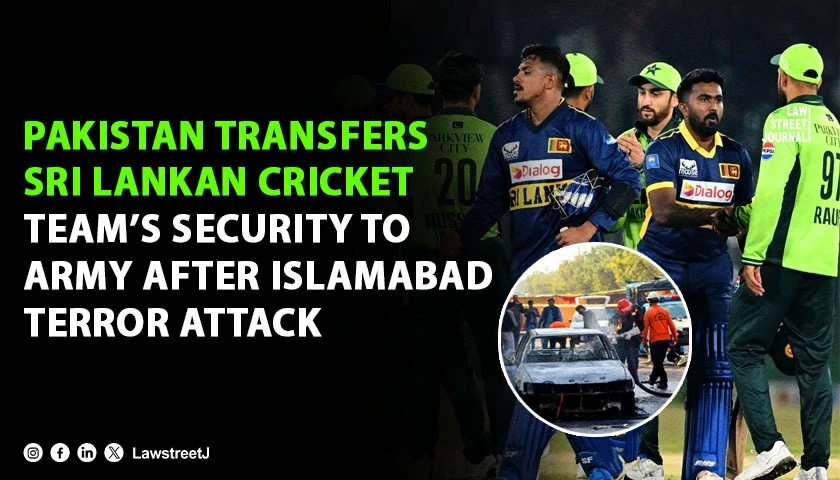New Delhi: Pakistan has placed the security of the visiting Sri Lankan cricket team under the direct control of the Pakistan Army after a suicide bombing in Islamabad on November 10, 2025. The explosion, which left 12 people dead and injured at least 27 others, led to a rapid review of security arrangements for all foreign teams in the country. Officials said the decision was taken to ensure that the ongoing cricket tour could continue without exposing players or staff to further risk.
Security Overhaul After the Islamabad Blast
The attack in Islamabad occurred only hours after the Sri Lankan squad began its ODI series against Pakistan in Rawalpindi. News of the blast caused immediate concern among Sri Lankan players and officials, with some members of the touring party considering returning home. As tensions rose, Pakistan’s Interior Ministry initiated discussions with Sri Lankan authorities to address the situation and provide detailed explanations of the security measures being implemented.
Interior Minister and Pakistan Cricket Board (PCB) Chairman Mohsin Naqvi contacted senior Sri Lankan officials as part of these consultations. Army Chief General Asim Munir also reached out directly to Sri Lankan Defence Minister Pramitha Bandara Tennakoon and assured him that the Pakistan Army would take full responsibility for the team’s safety. These assurances played a crucial role in convincing the Sri Lankan squad to remain in Pakistan.
Following the approval of military deployment, Pakistan introduced extensive protective measures. Army units, Rangers, and police forces were stationed around the team’s accommodation, travel routes, training facilities, and match venues. Officials described the arrangements as “president-level security,” involving armored transport vehicles, multi-layered checkpoints, and coordinated surveillance. Movements of the Sri Lankan team are now monitored throughout the day, with dedicated security escorts accompanying every transfer.
As part of these changes, the PCB relocated the entire T20 tri-nation series featuring Pakistan, Sri Lanka, and Zimbabwe to Rawalpindi. The matches had originally been scheduled across multiple cities, including Lahore. Authorities stated that centralizing the fixtures would allow security agencies to focus their resources more efficiently. The series is also viewed as an important preparation stage for the 2026 ICC T20 World Cup.
Legal Basis and Diplomatic Coordination
Pakistan’s decision to deploy the army is supported by constitutional and statutory provisions. Under Article 245 of the Constitution of Pakistan, the federal government has the authority to call upon the armed forces to assist civil institutions when public order or security is threatened. This provision was invoked after the Islamabad bombing to formalize the army’s involvement in protecting the visiting team.
Further legal grounding comes from the Pakistan Army Act, 1952, and the Anti-Terrorism Act, 1997, both of which allow military participation in counter-terrorism and public-safety operations. Officials also noted that the decision aligns with Pakistan’s responsibilities under the Vienna Convention on Diplomatic Relations (1961), which requires host states to safeguard foreign delegations.
Sri Lanka, through its Ministry of Sports and Defence, expressed appreciation for Pakistan’s swift response. The Sri Lankan government stated that it was satisfied with the revised arrangements and did not issue any diplomatic protest. Instead, officials emphasized that they were committed to continuing the tour as long as the agreed-upon security measures remained in place.
Pakistan’s current actions are being viewed in the context of past security challenges. The memory of the 2009 attack on the Sri Lankan cricket team in Lahore continues to influence security planning for international matches. That incident resulted in Pakistan hosting few international teams for nearly a decade, with most home series being played at neutral venues. In recent years, Pakistan has worked to rebuild its reputation as a safe cricket destination, hosting successful tours by South Africa, Australia, England, and several others.
The events following the Islamabad bombing demonstrate the continued sensitivity surrounding sports-related security in the region. Officials acknowledged the seriousness of the situation but stressed that immediate coordination between security agencies, government ministries, and foreign counterparts helped avoid the cancellation of the tour.
PCB Chairman Mohsin Naqvi met with Sri Lankan team members to personally explain the enhanced arrangements and assure them that the state was fully committed to their safety. According to officials present at the meeting, the players expressed relief after receiving detailed briefings and were satisfied with the measures adopted.
Despite the heightened alert level, the ODI series and the tri-nation T20 series are continuing as planned. All matches are being held under strict surveillance, with security agencies coordinating real-time monitoring around stadiums and accommodation zones. So far, no disruptions to the schedule have been reported.
Pakistan’s decision to invoke constitutional authority, deploy the army, and engage diplomatically with Sri Lanka is being described as a necessary response to an unpredictable security environment. By adhering to legal frameworks and maintaining communication with foreign partners, Pakistan aims to demonstrate its capability and commitment as an international cricket host.







